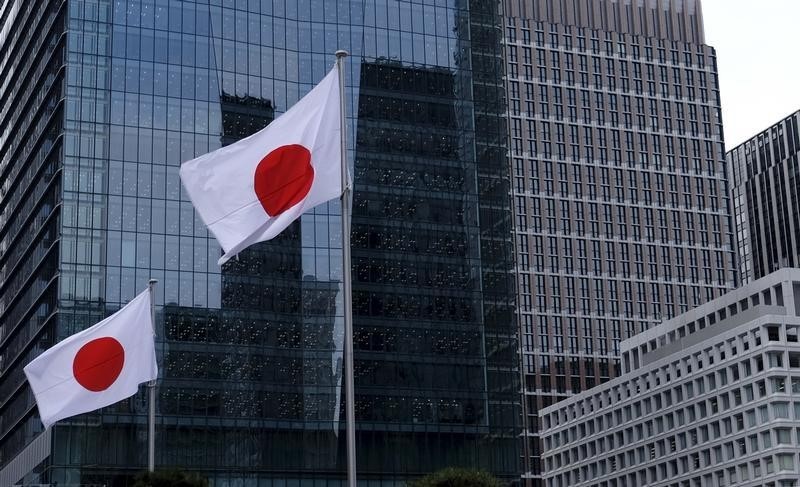(Bloomberg) -- What was meant to be a landmark year for Japan-China relations has turned sour, as the U.S. standoff with Beijing leaves Prime Minister Shinzo Abe caught up in a fight between his country’s biggest trading partner and its sole military ally.
If all had gone according to plan, President Xi Jinping would have been feted on a state visit to Japan last month, the first of its kind in a decade. Instead, the event that Abe had told Xi would mark a “new era” in relations was called off as both countries battled the infection -- and its future is in question.
Abe is now looking to deflect collateral damage at home as the world’s two biggest economies battle over the pandemic and Hong Kong. The tensions between Japan’s largest trading partners come as Abe tries to revive a Japanese economy that analysts expect to suffer a contraction of almost 22% this quarter, the deepest for records back to 1955.
A staunch supporter of Donald Trump, Abe has stood by the U.S. president in recent weeks. And that could pose risks for Japan’s exposure in China.
“If Abe falls out with China completely, it will be detrimental to him at home and abroad,” said Shi Yongming, a former Chinese diplomat to Japan and now a research associate at the China Institute of International Studies.
But a flare up in a territorial dispute between the two Asian powers and Beijing’s move last week to impose new security legislation that could stifle dissent in Hong Kong has helped stoke a resurgence of Japan’s own wariness toward China. Some in Abe’s own party, as well as opposition groups, are questioning whether Xi should visit Tokyo at all.
That could be a blow to Abe, who has poured time into mending a relationship with China that was at its most hostile in decades when he took office in 2012 -- the peak of a dispute over contested islands. While he succeeded in restoring official visits, and opened Japan’s doors to Chinese tourists, mistrust has simmered.
So far, the economic side of the relationship has continued to be strong even as political issues have waxed and waned. Japan’s foreign direct investment in China rose by 37% from 2016 to 2019, according to Ministry of Finance data. Abe’s administration has said economic ties are good and China has steered clear of taking on Tokyo in the same way it has battled Trump.
But there have been signs that the relationship could get worse. Last month, Japan earmarked $2.2 billion of an economic stimulus package to help manufacturers who want to reduce dependence on China. This month it will implement a law restricting foreign investment in companies it says are core to national security.
The measure seems aimed at China’s Huawei Technologies Co. despite Beijing’s warnings that any restrictions on its technology could damage bilateral ties. Trump has urged allies to block the company, saying its technology would open the door to espionage. Huawei has repeatedly denied the claims.
Japan will require agencies and companies that handle residents’ information to take national security risks into consideration when they buy communication equipment, national broadcaster NHK reported, adding the plan will effectively see Japan speed up its removal of Huawei products.
“Japan is always wary of China,” said Bonji Ohara, a former military attaché in Beijing and now senior fellow at the Sasakawa Peace Foundation in Tokyo. “If the U.S. takes a hard line on China, that gives Japan more room to move.”
No Doubt
As the spats have unfolded, China has taken a markedly softer line on Japan than against the U.S., avoiding the need to confront both at once. For its part, Japan is keen to avoid escalating tensions too far with a key business partner, as its economy tanks due to the coronavirus.
Abe has stood by Trump and expressed a willingness to fly to the U.S. to attend a Group of Seven summit in person this month, even though domestic media say he might have been forced to quarantine for two weeks after his trip. Trump has now postponed the event.
As Trump vowed “strong” and “meaningful” actions against China over Hong Kong, Tokyo issued a strongly worded statement of concern, calling in the Chinese ambassador to convey the message directly.
That came just days after Abe appeared to back Trump by telling reporters there was no doubt that the new coronavirus had spread from China to the rest of the world. His remarks sparked a reprimand from Beijing, which says the origins of the virus were unclear and should be investigated scientifically.
Japan has experience of Beijing’s use of economic leverage, after a scare a decade ago when China put the brakes on its supply of rare earth metals that are essential for Japan’s high-tech industries.
“When China increases its economic influence, it tries to use that to get others to agree to its demands,” Ohara said. It could even try to use supplies of any future coronavirus vaccine in the same way, he added.
©2020 Bloomberg L.P.
